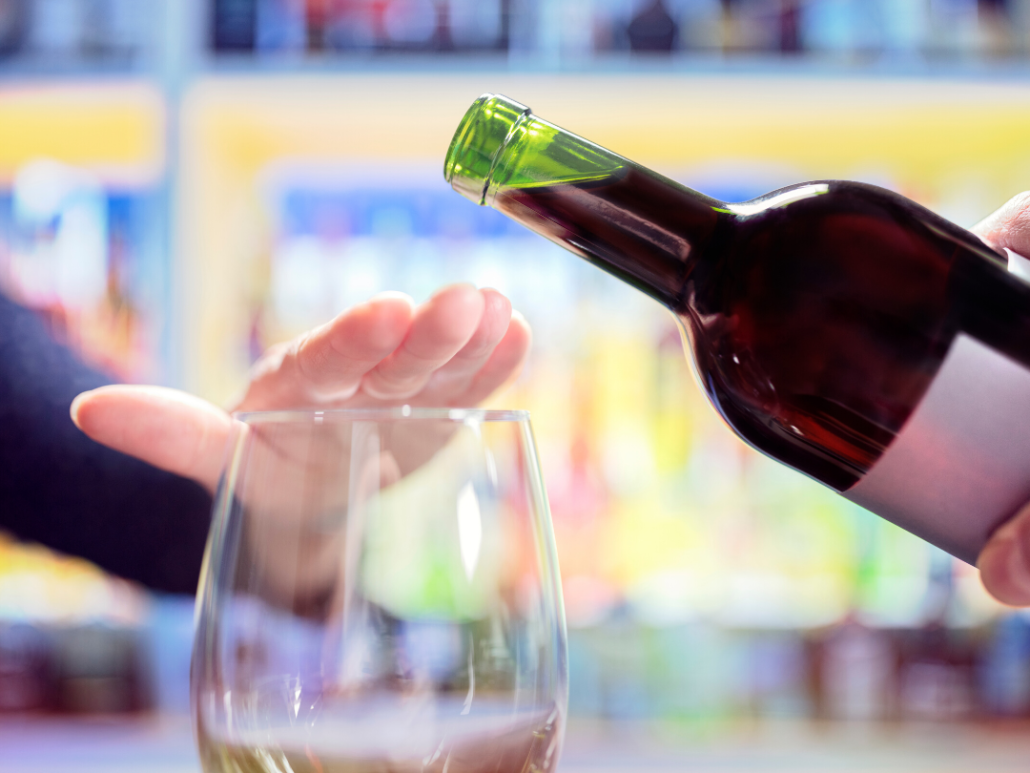Psychosis associated with alcohol can occur with acute intoxication, alcohol withdrawal, and patients with chronic alcohol use disorder. The particular diagnosis of alcohol-induced psychosis is also known as alcohol hallucinosis.
It is a relatively unusual consequence of alcohol use. However, it may be more widespread than classically thought, depending on the inclusion criteria used for diagnosis. Generally, in alcohol-induced psychosis, symptoms of psychosis present during or shortly after heavy alcohol consumption.

Clinically, alcohol-related psychosis is comparable to schizophrenia but is a unique and independent condition. Basically, hallucinations, paranoia, and fear characterize it. [1]
History and Symptoms
As with any form of psychosis, patients with alcohol-related psychosis may present a variety of symptoms. However, the presence of notable hallucinations or delusions must be evident. The psychosis is more extreme than what could probably be attributed to alcohol intoxication or withdrawal.
Appropriate attention should be paid to mental status, including flat affect or reacting to internal stimuli. Additionally, a good physical exam needs to look for potential trauma or infectious causes of altered mental status.
Psychosis is sometimes considered a break from reality because the cognitive and perceptual changes associated with certain psychotic illnesses may give rise to symptoms such as:
- Seeing, hearing, or feeling things that aren’t there
- Unwarranted thoughts or persecutory beliefs
Other Symptoms of Psychosis may include: [2]
- Disturbed thoughts or perceptions
- Poor executive functioning
- Trouble thinking clearly or concentrating
- Memory Problems
- Difficulty understanding what is real
- Behavior that is inappropriate for the situation
- Incoherent Speech
- Delusions
- Hallucinations
Approximately 3 out of every 100 people will encounter some form of psychosis in their lifetimes, with many first psychotic episodes appearing in their later teen years or early 20s. [4] Although the causes of psychosis are not fully understood, a combination of factors may probably add to its development; for example:
- Genetics (e.g., a positive family history of psychosis or psychotic disorders)
- Life Experiences
- Specific Chemical Imbalances in the Brain
- Alcohol or Drug Use may all be associated with the development of psychotic disorders

Get Your Life Back
Find Hope & Recovery. Get Safe Comfortable Detox, Addiction Rehab & Mental Health Dual Diagnosis High-Quality Care at the We Level Up Treatment Centers Network.
Hotline (877) 378-4154There are Three Types of Alcohol Induced Psychosis
I. Delirium Tremens (Alcohol Withdrawal) Psychosis
Delirium tremens psychosis occurs during alcohol withdrawal syndrome. Individuals will start to experience delirium within 4 to 7 days of quitting alcohol consumption. Moreover, symptoms of the condition will include:
- Sensitivity to Sensory inputs (lights, sounds, touch, etc.)
- Disorientation
- Severe Confusion, Fear, or Agitation
- Visual and Auditory Hallucinations
- Persecutory Delusions (the sensation of being chased)
- High Blood Pressure, Temperature, and Pulse
- Mood Swings
Individuals with this condition need medical support, and a supervised program can help them comfortably detox. Moreover, sedatives like benzodiazepines may also be advisable.
Above all, if you disregard delirium tremens psychosis, it can become life-threatening.
II. Alcohol Poisoning (Acute Intoxication) Psychosis
Alcohol poisoning psychosis is seldom called acute intoxication. Intoxication occurs after an individual drink a considerable amount of alcohol. Sometimes, symptoms can happen while the person is under intoxication. Other times they happen when the body is free of alcohol.
People can undergo severe aggression or psychotic reactions for several hours. Often, they won’t remember anything (amnesia) following the psychotic episode.
Other factors such as hypoglycemia (low blood sugar) or psychotropic drugs (e.g., stimulants) can double the risk of developing alcohol poisoning and alcohol poisoning psychosis.
III. Chronic Alcohol Induced Psychosis
Alcoholic hallucinosis occurs after years of chronic alcohol abuse. It shares some indications with delirium tremens psychosis.
For instance, Psychotic Symptoms can include:
- Vivid, Auditory Hallucinations
- Visual Hallucinations
- Paranoia
- Persecutory Delusions (the sensation of being chased)
- Fear
- Mood Swings
Hallucinations are often auditory with alcoholic hallucinosis. Mood disturbances are common as well.
The periods of psychoses last longer with alcoholics. They may last hours, days, or weeks. This makes alcoholic hallucinosis appear like paranoid schizophrenia. However, there has been no evidence for the genetic connection between the two conditions.
Get Help. Get Better. Get Your Life Back.
Searching for Accredited Drug & Alcohol Rehab Centers Near You? Or Mental Health Support?
Even if you have failed previously, relapsed, or are in a difficult crisis, we stand ready to support you. Our trusted behavioral health specialists will not give up on you. Call us when you feel ready or want someone to speak to about therapy alternatives to change your life. Even if we cannot assist you, we will lead you wherever you can get support. There is no obligation. Call our hotline today.
FREE Addiction Hotline – Call 24/7Early Warning Signs of Alcohol Induced Psychosis
Warning Signs of the condition can appear either during or after alcohol consumption.
Some Warning Signs of Alcohol-Induced Psychosis may include:
- Difficulties Concentrating or thinking with a clear mind
- Self-care or Hygiene abruptly begins to decline
- Hearing or Seeing things that others don’t
- Intense, Aggressive Emotions or Outbursts
Alcohol Induced Wernicke-Korsakoff Syndrome
Wernicke-Korsakoff syndrome (WKS) refers to a thiamine (vitamin B1) deficiency. Excessive long-term alcohol consumption can cause a thiamine decline in your body. This leads to brain damage and can provoke hallucinations and memory loss. It can also harm your liver, gastrointestinal tract, and pancreas.
Wernicke Encephalopathy is the Acute Version, and symptoms include:
- General Confusion
- Loss of Mental Activity
- Loss of Muscle Coordination
- Tremors
- Strange Eye Movements
- Vision Changes (double vision)
Korsakoff Syndrome is the Chronic (long-lasting) Version, and symptoms include:
- Memory Loss (similar to dementia)
- Inability to Form New Memories
- Hallucinations
- Delusions
These conditions may manifest the same symptoms as alcohol-induced psychosis. However, your mental abilities will proceed to worsen with Wicke-Korsakoff Syndrome.
Treatment for Alcohol Induced Psychosis
The priority is to stabilize the client paying close concentration to the airway, breathing, and vital signs. If you require sedation due to alcohol-related psychosis, neuroleptics, such as haloperidol, have been the first-line medications for treatment.
Benzodiazepines, such as lorazepam, are also available for medication if there is a concern for alcohol withdrawal and seizures. In addition, certain atypical antipsychotics, such as ziprasidone and olanzapine, have also been capable to help calm clients with acute psychosis.
Unfortunately, some patients may need the use of physical restraints to secure the patient as well as the staff. Given that, patients with alcohol-related psychosis must also have an assessment for suicidality because the illness has a connection with higher suicidal behaviors. [2]
Comfortable Facilities & Amenities
High-Quality Addiction & Mental Health Rehabilitation Treatment
Rehab Centers TourRenowned Addiction Centers. Serene Private Facilities. Inpatient rehab programs vary.
Addiction Helpline (877) 378-4154Proven recovery success experience, backed by a Team w/ History of:
15+
Years of Unified Experience
100s
5-Star Reviews Across Our Centers
10K
Recovery Success Stories Across Our Network
- Low Patient to Therapist Ratio
- Onsite Medical Detox Center
- Comprehensive Dual-Diagnosis Treatment
- Complimentary Family & Alumni Programs
- Coaching, Recovery & Personal Development Events
Alcohol Induced Psychosis Severe Cases
Generally, most cases of alcohol-related psychosis come to light when clients are admitted to the hospital and then develop withdrawal symptoms with or without delirium tremens. The presence of alcohol-related psychosis usually means something severe and, if not treated immediately, can lead to adverse outcomes. Therefore, healthcare workers should be familiar with this disorder and make suitable recommendations to specialists if they have such clients.
Besides psychosis, these clients have a much greater rate of anxiety, depression, and suicide. In addition, the patients can be unpredictable and resort to violence. Therefore, these patients need to be under monitoring with an interprofessional team of allied healthcare workers to lessen morbidity and death.
We Level Up NJ Alcoholism Treatment Center

For those suffering from addiction or alcoholism, We Level Up New Jersey treatment center is here. As a licensed and accredited rehabilitation center, we are dedicated to helping you meet your goals, one day at a time.
To help you find and maintain sobriety, we favor a personalized approach to care. Firstly, from the moment you begin with us, our counselors will help you find a path that fits with your background; your substance(s) of choice, your lifestyle, your interests, and your unique needs.
World-class, Accredited, 5-Star Reviewed, Effective Addiction & Mental Health Programs. Complete Behavioral Health Inpatient Rehab, Detox plus Co-occuring Disorders Therapy.
CALL (877) 378-4154End the Addiction Pain. End the Emotional Rollercoaster. Get Your Life Back. Start Drug, Alcohol & Dual Diagnosis Mental Health Treatment Now. Get Free No-obligation Guidance by Substance Abuse Specialists Who Understand Addiction & Mental Health Recovery & Know How to Help.
To Best Customize Our Services To Your Needs, our programming includes:
- Family Therapy
- Individual Therapy
- Humanistic Therapy
- Group Addiction Therapy
- Cognitive Behavioral Therapy
- Mindfulness Training for Stress Reduction
Inpatient Alcohol Rehab & Comfortable Detox
Alcohol detox can be dangerous, mainly if you do it without the help of a professional. Because delirium tremens and other withdrawal symptoms that may afflict the detoxing patient are hazardous and fatal. Therefore, it is advisable to detox in a rehab center to access qualified professionals who can manage comfortable alcohol detox and withdrawal complexities.
If you or a loved one is dealing with an addiction to alcohol or other drugs, especially if you have experienced multiple relapses in the past, then look no further. In addition, with an incredible success rate for long-term recovery, We Level Up NJ Treatment Center offers one of the most comprehensive addiction recovery programs available in The United States, bringing hope to families every day.
If you or someone you love is seeking safe, secure, and compassionate resources for alcohol-induced psychosis treatment, We Level Up NJ is here for you. Call us and speak with an addiction counselor today about our levels of care.
Experience Transformative Recovery at the We Level Up Treatment Center.
See our authentic success stories. Get inspired. Get the help you deserve.



Start a New Life
Begin with a free call to an addiction & behavioral health treatment advisor. Learn more about our dual-diagnosis programs. The We Level Up treatment center network delivers various recovery programs at each treatment facility. Call to learn more.
- Personalized Care
- Caring Accountable Staff
- Comfortable Amenities
- Licensed & Accredited
- Renowned w/ 5-Star Reviews
We’ll Call You
Sources:
[1,3] Alcohol-Related Psychosis – National Center for Biotechnology Information, U.S. National Library of Medicine
[2] First-Episode Psychosis and Co-Occurring Substance Use Disorders – Substance Abuse and Mental Health Services Administration
[4] FACTS ABOUT PSYCHOSIS – National Institute of Mental Health